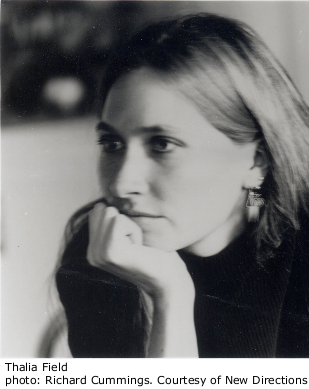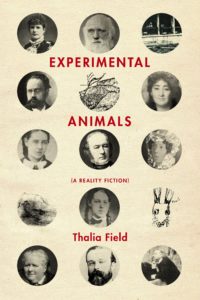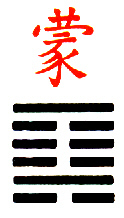
Thalia Field is from Chicago. She worked in theatre as a writer, director, and producer before beginning to write books. Thalia has lived and worked in Paris, Berlin, and New York, as well as spending many summers in Juneau, Alaska where she helped to start a summer writing project. Thalia has been teaching fiction and multimedia and interdisciplinary creative/critical practice in the Literary Arts department at Brown University since 2000.
PRISM international is honoured to have Thalia Field as the judge for the 2018 Jacob Zilber Prize for Short Fiction (Deadline January 31st!). Poetry editor, Shazia Hafiz Ramji, talks to Thalia about cross-genre writing, the meaning of “process,” and current reads.
Your first book Point and Line (New Directions, 2000) defies categorization, and borrows from genres such as poetry, fiction, and performance to discuss how thought moves in the mind and across the field of the page. In your most recent book, Experimental Animals (A Reality Fiction) (Solid Objects, 2016), you use the archival material of Claude Bernard, a physiologist who experimented on live animals, as well as documents from his circle of friends such as Emile Zola and Charles Darwin. Both books make visible the process of thinking and writing. What does “process” mean for you?
 Your question identifies something I’ve always been obsessed by… ever since Point and Line… namely the skewed relationships between thinking, stories, and actions. The process of thinking, natural enough on its own, seems to get so farcically (disastrously?) caught up in traps of character, and this leads to heroic efforts, toward storytelling, toward action. This process, that for me writing can inquiry about, reveals fascinating tangles and complexities. Complexities between thinking beings, whether human or animal, but for my purposes, human in a world we’d like to control by these very same thoughts, stories, and actions. In my earlier work I was already inquiring about the way silence functions in this ecology of thinking and acting, as a subverting agent of sorts. In Bird Lovers, Backyard and in Experimental Animals, silence continues to undermine the legitimacy of history and narrative coherence. It is often an excess of story/thinking that leads to a productive silence. I think I’ve tried to explore that process in a number of ways through all of my books.
Your question identifies something I’ve always been obsessed by… ever since Point and Line… namely the skewed relationships between thinking, stories, and actions. The process of thinking, natural enough on its own, seems to get so farcically (disastrously?) caught up in traps of character, and this leads to heroic efforts, toward storytelling, toward action. This process, that for me writing can inquiry about, reveals fascinating tangles and complexities. Complexities between thinking beings, whether human or animal, but for my purposes, human in a world we’d like to control by these very same thoughts, stories, and actions. In my earlier work I was already inquiring about the way silence functions in this ecology of thinking and acting, as a subverting agent of sorts. In Bird Lovers, Backyard and in Experimental Animals, silence continues to undermine the legitimacy of history and narrative coherence. It is often an excess of story/thinking that leads to a productive silence. I think I’ve tried to explore that process in a number of ways through all of my books.
The narrator of Experimental Animals is Claude’s wife, Fanny Bernard, who doesn’t approve of his animal testing. How did you come to the decision to make Fanny the narrator?
Ah… that was a late, and finally desperate decision. I had originally desired, conceptually, for the whole book to be exclusively first-person original material, collaged into a story of the arguments. However, when I finally came to shaping the materials I had collected through my archival research, I realized how woefully little there was of Fanny, and that in her absence there was a reflection of the voicelessness of the animals. She and many of the other women are lost to the archives, which, page-based, text-based, do not capture the range of voices, animals included, of history. Once I realized this, it became clearer what the role of fiction is within the historical process, a way to reimagine those voices, to put them into play in the present.
Your work is characterized by attention to the artifice that makes stories. In chapter one of “Crossroads,” a poem from Bird Lovers, Backyard, you write: “Always start by saying that this is not a ‘ghost’ story. Cozy and protective as such stories were, they were only fun at first. Like nuns besieged by poltergeists who ‘tickled them near to death’ — that’s cute.” How do you balance a kind of analytical skepticism with the rich world of story creation that relies on artifice?
That’s a great question. I think that using skepticism of inherited narratives, theories, even “truths” opens up the reader’s impulse to search. Searching, asking, confronting paradox, encountering excess, contradictions, these are how different inheritances can be deployed to reveal entirely new awareness. That’s what I’d like to achieve, for myself first, then the readers, is a kind of exhaustion of what we’ve inherited, a letting go of that grasping to the past, and a way of feeling situations for a different kind of truth, a truth that’s based on compassion and kindness before all else, emerging from the silence of the language we use to distance ourselves from awareness. To do this, I think I’ve always wanted to hear all the residue and all the trash, all the leftovers and especially the treasures — everything we hoard so that we don’t have to encounter a more naked, exposed, or decluttered situation. Again, it’s the silence that comes after many knots have been unraveled, after many many words have burned themselves out.
What have you been reading recently? How did you come to read it?
I’m often reading either for new work or for teaching. Lately, I’ve been preparing a course based on a piece from my book, Incarnate:Story Material, called Zoologic, that explores the relationship of technology to animal surveillance and wildness. My students and I are reading Watching Wildlife, by Cynthia Chris, and Frankenstein’s Cat, by Emily Anthes. For new work, I’m reading far and wide since I’m just starting out a new book. And for fun (fun?) I’m reading from the collected works of Jane Addams and trying to watch talented women comedians whenever and wherever I can catch them.
What kind of work makes you feel excited, curious, and renewed?
Works that feels relevant (not necessarily dogmatic), in forms that aren’t stale, with playful seriousness, that at some level reveal the fundamental absurdity of life. Basically I love innovative tragi-comic works that shimmer like oracles.
***
 In “Recapitulation: Youthful Folly” from Bird Lovers, Backyard, you use readings of I Ching hexagrams to tell the story of Vicki Hearne, poet, philosopher, dog-trainer. Many writers draw on methods of “divination.” The poet Dorothea Lasky and the novelist Thomas Pynchon have both used the Tarot in their work. How and when do you use methods of divination in your work?
In “Recapitulation: Youthful Folly” from Bird Lovers, Backyard, you use readings of I Ching hexagrams to tell the story of Vicki Hearne, poet, philosopher, dog-trainer. Many writers draw on methods of “divination.” The poet Dorothea Lasky and the novelist Thomas Pynchon have both used the Tarot in their work. How and when do you use methods of divination in your work?
I mostly threw I Ching during a period of deep engagement with the study and practice of Toaism/Buddhism. Simultaneously, I was learning with Lila (dog) and Vicki Hearne (human) the literary and personal implications of command and training. That stochastic and uncontrolled (world) experiences can give profound “teachings” became indisputable to me. Perhaps that’s the lesson of all forms of divination? More important was how all forms of teaching are individual practices of clarity and humility, of listening, of understanding the different grammars of thought and language and power. Ultimately, being a good teacher, or student, is about awareness and kindness, about sitting still instead of making confusion, about all the meanings of learning to “sit”. That was why the IChing made it into that piece – it was the first book that really took me to task for needing to be a better student and reader of life.
What fictional character do you wish you were?
I would love to live in a Jane Austen novel or a Shakespearean comedy. There’s an optimism and humour to human suffering that I think I could endure pleasurably, and a verbal atmosphere that would be fun to live inside. Every time I’m suffering (or in any situation) I try to identify from whose literary world I could draw wisdom. Sometimes it’s very clear I’m in a Dostoyevsky world, an Ionesco play, a Kafka world, a Spark novel or often, a Duras novel or Beckett play. What is the logic of what’s happening? What sort of events make sense? What endgame is being played? What language can work? What questions should be asked? What would the characters do? How are they trapped? The power of literature is the power of specifically different worlds to reach out and embrace us with their wisdom and clarity.
What is the best advice you’ve received?
Don’t believe thoughts.
All things change.
Don’t cover awareness with language.
Why do you write?
Placing questions and conversations into the world that I want to see there.
Personal survival.
What is the last question you asked yourself?
I guess it would be that one!